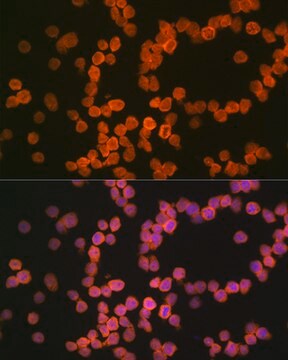CS0007
Methanol Quantification Assay Kit
Sufficient for 200 fluorometric tests
Synonym(s):
Methanol Assay kit, Methanol kit
Sign Into View Organizational & Contract Pricing
All Photos(2)
About This Item
UNSPSC Code:
12161503
NACRES:
NA.84
Recommended Products
format
mixture
shipped in
dry ice
storage temp.
−20°C
Related Categories
General description
Methanol is a simple alcohol, comprised of a hydroxyl group and a methyl group. It is typically used in antifreeze, fuel, and other products. Methanol is often used as a solvent or building block for chemical synthesis. Many anaerobic bacteria produce methanol.
Methanol is found at very low levels in alcoholic beverages. Small amounts of methanol are present in normal, healthy human individuals. However, higher levels of methanol are toxic. Methanol poisoning typically occurs following ingestion of a methanol-containing product. The basis of the toxic effects of methanol is attributed to format, to which methanol is eventually converted. Elevated format levels can lead to confusion, blindness, and death. Due to its high toxicity, methanol is used as an additive in many industrial alcohol products, to prevent human consumption.
The Methanol Quantification Assay Kit provides simple and sensitive procedure for measuring methanol in various sample types. Methanol concentration is determined via a coupled enzymatic reaction. The fluorescence intensity, measured at λex=535nm/λem= 590nm, is proportional to the amount of methanol present in the sample. The linear ranges of this kit are 0.5–10nmol.Our Methanol quantification assay kit can be used to quantify methanol in biological samples such as serum and plasma, and in beverages (both alcoholic and non-alcoholic beverages). The methanol quantification assay kit is highly specific to methanol, with less than 10% cross reactivity towards 100 nmol ethanol over 10 nmol methanol (i.e., over 100-fold specificity). The detection is fast: Only 15 min. Detection can be done at room temperature.
Our economical methanol quantification assay kit also saves your time and efforts:
Methanol is found at very low levels in alcoholic beverages. Small amounts of methanol are present in normal, healthy human individuals. However, higher levels of methanol are toxic. Methanol poisoning typically occurs following ingestion of a methanol-containing product. The basis of the toxic effects of methanol is attributed to format, to which methanol is eventually converted. Elevated format levels can lead to confusion, blindness, and death. Due to its high toxicity, methanol is used as an additive in many industrial alcohol products, to prevent human consumption.
The Methanol Quantification Assay Kit provides simple and sensitive procedure for measuring methanol in various sample types. Methanol concentration is determined via a coupled enzymatic reaction. The fluorescence intensity, measured at λex=535nm/λem= 590nm, is proportional to the amount of methanol present in the sample. The linear ranges of this kit are 0.5–10nmol.Our Methanol quantification assay kit can be used to quantify methanol in biological samples such as serum and plasma, and in beverages (both alcoholic and non-alcoholic beverages). The methanol quantification assay kit is highly specific to methanol, with less than 10% cross reactivity towards 100 nmol ethanol over 10 nmol methanol (i.e., over 100-fold specificity). The detection is fast: Only 15 min. Detection can be done at room temperature.
Our economical methanol quantification assay kit also saves your time and efforts:
- Highly sensitive, simple and high-throughput assay for measuring methanol in a variety of samples
- User friendly: No need to weigh or calculate needed amounts of reagents on your own
- Supportive calculator (Click here to download a calculator excel file): Will calculate the reagents needed according to your experimental needs, and analyze your results based on your experimental data!
- Quick instruction bench card - to assure your experimental success
- More experiments in one kit - contains sufficient reagents for 200 fluorometric tests.
- Detection time: only 15 minutes
- Detection can be done at room temperature.
Features and Benefits
- Quantifying methanol in biological samples (serum, plasma and urine)
- Quantifying methanol in alcoholic and non alcoholic beverages
- Quantifying methanol in anaerobic microbial cultures
Suitability
Suitable for the detection of methanol in biological samples, beverages and more
Signal Word
Danger
Hazard Statements
Precautionary Statements
Hazard Classifications
Acute Tox. 3 Dermal - Acute Tox. 3 Inhalation - Acute Tox. 3 Oral - Flam. Liq. 2 - STOT SE 1
Target Organs
Eyes
Storage Class Code
3 - Flammable liquids
Flash Point(F)
49.5 °F - closed cup
Flash Point(C)
9.7 °C - closed cup
Certificates of Analysis (COA)
Search for Certificates of Analysis (COA) by entering the products Lot/Batch Number. Lot and Batch Numbers can be found on a product’s label following the words ‘Lot’ or ‘Batch’.
Already Own This Product?
Find documentation for the products that you have recently purchased in the Document Library.
J A Kruse
Intensive care medicine, 18(7), 391-397 (1992-01-01)
Methanol ingestion is an uncommon form of poisoning that can cause severe metabolic disturbances, blindness, permanent neurologic dysfunction and death. While methanol itself may be harmless, it is converted in vivo to the highly toxic formic acid. The diagnosis is
A Paine et al.
Human & experimental toxicology, 20(11), 563-568 (2002-04-03)
Methanol, a potent toxicant in humans, occurs naturally at a low level in most alcoholic beverages without causing harm. However, illicit drinks made from "industrial methylated spirits" [5% (v/v) methanol:95% (v/v) ethanol] can cause severe and even fatal illness. Since
Bruno Mégarbane et al.
Intensive care medicine, 31(2), 189-195 (2005-01-01)
Ethylene glycol (EG) and methanol are responsible for accidental, suicidal, and epidemic poisonings, resulting in death or permanent sequelae. Toxicity is due to the metabolic products of alcohol dehydrogenase (ADH) and aldehyde dehydrogenase. Conventional management of these intoxications consists of
Our team of scientists has experience in all areas of research including Life Science, Material Science, Chemical Synthesis, Chromatography, Analytical and many others.
Contact Technical Service





